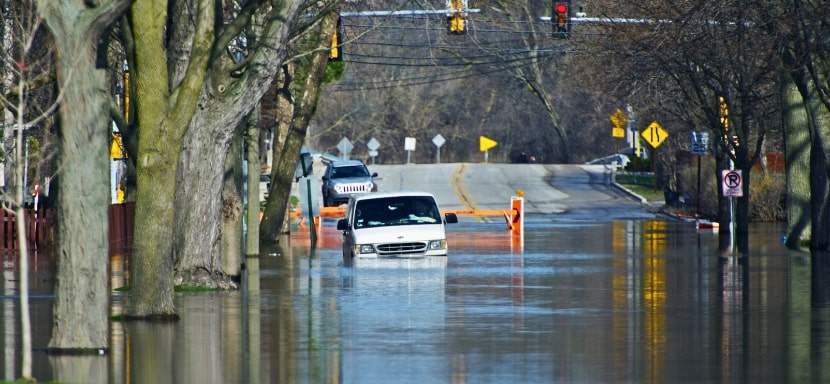How to Survive a Helicopter Crash

If you ever find yourself in a helicopter plummeting toward the ground, the odds can feel stacked against you. You picture fiery explosions, wild spinning blades, and—worst of all—your life flashing before your eyes. But here’s the thing: helicopter crashes are survivable more often than you might think. Many crash landings end without a single casualty; with the proper knowledge, you can give yourself the best shot at walking away in one piece.
We don’t plan our lives expecting to survive falling from the sky. Knowing what to do before, during, and after impact can be the difference between life and death. Whether you’re an adventure traveler or unlucky enough to find yourself on a rogue chopper, survival skills start with preparation and a calm mind.
Key Points
- Brace for impact by adopting the correct crash position.
- Stay calm and focus on getting out quickly once the aircraft stops moving.
- Survival gear matters—know where life vests, fire extinguishers, and emergency exits are located.
Why a Helicopter Might Crash
Although rare, helicopter crashes happen due to human, mechanical, and environmental factors. Here are the most common causes:
Pilot Error
- Misjudging weather or flight conditions
- Fatigue or poor communication with air traffic control
Mechanical Failures
- Engine failure or rotor malfunctions
- Issues with hydraulics or other critical systems
Bad Weather
- Fog, turbulence, or strong winds
- Ice forming on blades, reducing lift
Obstacles and Bird Strikes
- Collisions with birds, power lines, or trees
Fuel Issues
- Running out of fuel or undetected leaks
Controlled Flight Into Terrain (CFIT)
- Flying into terrain due to poor visibility
10 Proven Steps to Stay Alive During a Helicopter Crash
Surviving a helicopter crash might sound impossible, but many people survive these accidents by following the proper steps. Quick thinking, preparation, and staying calm can drastically improve your odds.
Here are ten proven steps to help you stay alive if the unexpected happens.
1. What to Know Before Boarding the Helicopter
Preparation starts long before the crash. The moments before takeoff are crucial for setting yourself up for success if things go south.
Check Safety Equipment
- Take note of where the emergency exits are located.
- Ensure you know where the life vests, seatbelts, and fire extinguishers are.
- If you’re flying over water, ensure the aircraft has flotation devices.
Wear the Right Clothing
Avoid loose clothing that can snag on things. Wear non-flammable fabrics like cotton rather than synthetics, which can melt in a fire. Boots or sturdy shoes are ideal—you’ll need them if you must walk away from the crash site.
Did You Know?
In many helicopter crashes, sitting next to an emergency exit can increase your survival chances by up to 250%. Helicopter cabins can fill with smoke or water within seconds, and being close to an exit reduces the time needed to escape. That’s why it’s crucial to memorize where the nearest exit is—even before takeoff.
2. Stay Calm During the Helicopter Descent
As terrifying as it sounds, staying calm is your most powerful tool during a crash. Panic wastes time and stops you from taking essential steps that could save your life.
Brace Position Saves Lives
The proper crash position depends on your seat. Here’s a quick breakdown:
- Front-facing seats: Bend forward, tuck your head between your knees, and protect your head with your hands.
- Side-facing seats: Cross your arms over your chest and tuck your chin down to protect your head and neck.
This isn’t just a silly yoga pose. Studies show that adopting the correct brace position significantly reduces injuries.
3. The Moment of Impact: What to Do
Impact feels like a truck hitting you at high speed—it will disorient you. The key is to stay conscious and focused. Once the helicopter has stopped moving, act quickly.
Assess Your Injuries
- Do a quick body scan: Are you bleeding? Can you move all your limbs?
- Help others only if you can—you won’t do anyone good by passing out from your injuries.
4. Escape the Helicopter Quickly
Helicopter crashes often involve fuel leaks, which means fire or explosions are real risks. You don’t want to linger.
Follow These Steps to Get Out Safely
- Undo your seatbelt or harness immediately.
- Find the closest exit and push, pull, or kick it open if necessary.
- If the door is blocked, use your shoes or a fire extinguisher to break a window.
- Crawl to safety if smoke or fire blocks your vision.
5. If the Helicopter Crashes Into Water
Water landings are terrifying, but survival is possible with the right approach. The key is to stay in your seat until the helicopter stops sinking.
How to Escape a Sinking Helicopter
- Take a deep breath before the water fills the cabin.
- Wait until the helicopter stops moving and the pressure equalizes before opening a door.
- Once free, swim to the surface and inflate your life vest. Don’t inflate it inside the cabin—it could trap you.
6. What to Do After Escaping the Wreckage
Even if you survive the crash, you’re not out of danger yet. Immediate priorities include getting to safety, avoiding fires, and treating injuries.
Move Away From the Wreckage
- Get at least 100 yards away—fires can ignite even after the crash seems over.
- Find a clear area to wait for rescue if you’re in the wilderness.
7. Treat Injuries and Find Shelter
Now that you’re clear of the wreckage tend to any injuries. Apply pressure to wounds, immobilize broken limbs, and use first-aid supplies if available.
Find Shelter or Stay Put?
Staying close to the crash site increases your chances of being found in remote areas. If you must move, mark the area with visible objects to guide rescuers.
8. Signal for Help and Wait for Rescue
Once you’re safe and stabilized, your goal is to get rescued. Use every tool at your disposal to make your location obvious.
Effective Ways to Signal Rescuers
- Use a signal mirror or reflective surface to catch the attention of passing aircraft.
- Build a fire to create smoke if it’s safe to do so.
- If you have a radio or beacon, activate it immediately.
9. Mental Fortitude: The Secret to Survival
Staying alive isn’t just about brute strength but mental endurance. The shock of surviving a helicopter crash can trigger fear, confusion, and panic, but keeping a clear head helps you make better decisions.
10. Practice and Preparation: The Best Way to Survive
While you can’t predict when or if you’ll experience a helicopter crash, learning advanced survival techniques can make a big difference. Consider attending helicopter safety training if you frequently travel by air, especially to remote areas.
How to Survive a Helicopter Crash
Surviving a helicopter crash involves a mix of preparation, quick thinking, and a bit of luck. The good news is that many people survive these accidents, especially when they take the right actions quickly.
Knowing how to brace for impact, escape efficiently, and stay calm under pressure can increase your odds of surviving and walking away from a crash.
FAQs
How common are helicopter crashes?
Helicopter crashes are relatively rare, but when they occur, they often happen in remote or challenging environments.
Can you survive a helicopter crash over water?
Yes, with the proper techniques. Waiting for the helicopter to stop moving, taking a deep breath, and using life vests are crucial survival steps.
What should I do if the helicopter catches fire after impact?
Exit the aircraft immediately and move at least 100 yards from the wreckage to avoid explosions.
How important is the brace position during a crash?
The brace position can significantly reduce injuries, protecting your head, neck, and spine.
What survival gear should I carry on a helicopter?
A life vest, multi-tool, small first-aid kit, and fire-starting tools are essential for emergencies.
Is mental preparedness important in a crash scenario?
Absolutely. Staying calm and focused increases your chances of survival.
Final Thoughts: Helicopter Crash Survival Tips
Helicopter crashes may sound like worst-case scenarios, but they are survivable with the right mindset and preparation. The key is to brace for impact, escape swiftly, and stay calm. Every second matters, and knowing what to do at each stage can make all the difference. Though no one ever hopes to use these skills, having them could one day save your life.
Notable Helicopter Crashes Where People Survived
Helicopter crashes may seem fatal, but many people have walked away from catastrophic incidents thanks to quick thinking and luck. Here’s a list of recorded helicopter crashes where passengers and crew survived against the odds.
-
The 1972 Andes Helicopter Crash: A Peruvian Air Force helicopter crashed while searching for the survivors of the Andes flight disaster. Despite rough conditions, everyone on board survived. The crash highlighted the importance of helicopter search missions in dangerous terrain.
-
The 1974 Sikorsky S-61 Crash (North Sea): A British Airways helicopter crashed into the North Sea while transporting oil workers. Despite the aircraft sinking in freezing waters, all 18 people on board survived, thanks to life jackets and quick rescue efforts.
-
The 1983 Malaysian Army Helicopter Crash: During a rescue operation, a helicopter crashed in the jungles of Sarawak, Malaysia. Remarkably, all 14 soldiers on board survived. Their training and ability to remain calm were credited for their survival in the remote jungle.
-
The 1991 R44 Helicopter Crash (New Zealand): A Robinson R44 helicopter crashed into a mountainside in New Zealand. Despite the impact, all three passengers survived due to the proper use of seat belts and a well-executed brace position.
-
The 2008 Colombian Army Helicopter Crash: A Colombian military helicopter was struck by a tree during a nighttime landing, causing it to crash. All 11 soldiers survived the ordeal, thanks to their military training and ability to safely exit the wreckage before it caught fire.
-
The 2013 North Sea Helicopter Crash: A Super Puma helicopter crashed into the North Sea while carrying offshore oil workers. Miraculously, 14 of the 18 people on board survived due to efficient emergency response and the deployment of the helicopter’s flotation devices.
-
The 2018 Grand Canyon Helicopter Crash: A sightseeing helicopter crashed in the Grand Canyon, killing three of the seven passengers. However, the four survivors managed to escape the wreckage and were rescued, proving the effectiveness of quick evacuation techniques in challenging terrains.
-
The 2020 Norwegian Coast Guard Helicopter Crash: A Norwegian Coast Guard helicopter went down during a routine mission. Despite severe conditions, the crew survived after activating emergency flotation devices and being rescued in record time, demonstrating the importance of pre-flight safety briefings and emergency preparedness.
More Air, Land & Sea Scenarios
How to Survive a Flash Flood While Driving
Surviving a flash flood while driving requires quick thinking, calmness, and a plan. This guide walks…
How to Survive a Hot Air Balloon Crash
Hot air balloon rides can be magical, with breathtaking views and a serene, floating sensation. But as…
How to Survive a Motorcycle Accident
Life on two wheels is exhilarating, but let’s not sugarcoat it—motorcycle wrecks are a real risk. Whether…
How to Survive Being Stuck in an Airport
Travelers love airports, right? You walk in with dreams of quick security checks, ample seating, and maybe…
How to Survive Jet Lag
We’ve all been there: you board a plane full of excitement, jet off to a far-flung destination, and…
Recent Survival Posts
How to Survive a Layoff
Layoffs feel personal—even when they’re not. One day, you’re responding to Slack messages and forwarding…
How to Survive a Drug Test
I never imagined I’d be so emotionally invested in a paper cup. But there I was, standing under the fluorescent…
How to Survive an Interrogation
If you’ve ever been caught in the crosshairs of an overly enthusiastic mall cop or stared down by someone…
How to Survive a Nightclub Shooting
Nightclubs pulse with life—lights flashing, music pounding, bodies packed tight on the dance floor. It’s a place to…
How to Survive a Bachelor Party
A bachelor party is a delicate mix of celebration, chaos, and questionable decision-making, wrapped…
More Air, Land, and Sea Survival Scenarios

How to Survive a Hot Air Balloon Crash
Hot air balloon rides can be magical, with breathtaking views and a serene, floating sensation. But as with any adventure, things can go awry. A hot air balloon crash is not a common air survival scenario, yet understanding how to respond effectively can make all the...

How to Survive a Motorcycle Accident
Life on two wheels is exhilarating, but let’s not sugarcoat it—motorcycle wrecks are a real risk. Whether you’re a seasoned rider or just learning, knowing how to survive a motorcycle wreck is crucial. By preparing beforehand, reacting wisely during the incident, and...

How to Survive Being Stuck in an Airport
Travelers love airports, right? You walk in with dreams of quick security checks, ample seating, and maybe a lounge with bottomless snacks. But what if your dream turns into a drawn-out nightmare, and you're stuck there for hours? Or worse, overnight. We've all been...

How to Survive Jet Lag
We’ve all been there: you board a plane full of excitement, jet off to a far-flung destination, and when you arrive, you feel like you’ve been hit by a bus. This, my friends, is jet lag. A cruel reminder that while airplanes can soar at 600 mph, our bodies are...

How to Survive a Car Submersion
Car accidents can happen at any time, and one of the most frightening scenarios is when a car is submerged in water. Knowing how to react in such situations can differentiate between life and death. My guide will walk you through the steps necessary to survive a car...
More Survival Scenarios

How to Survive a Layoff
When the Floor Falls Out: The Reality of a Layoff Layoffs feel personal—even when they're not. One day, you're responding to Slack messages and forwarding emails. Next, you're staring at your monitor as it logs you out... for good. Whether it's a restructuring, a...

How to Survive a Drug Test
The Cup, The Room, The Truth I never imagined I’d be so emotionally invested in a paper cup. But there I was, standing under the fluorescent hum of a strip-mall clinic, trying to recall the last time I ate a poppy seed bagel. That’s the thing about drug tests—they...

How to Survive an Interrogation
If you've ever been caught in the crosshairs of an overly enthusiastic mall cop or stared down by someone in a uniform with a clipboard and a glare, you’ve felt it — the chilly fingers of interrogation anxiety. And while most of us imagine interrogation scenes as...

How to Survive a Nightclub Shooting
Nightclubs pulse with life—lights flashing, music pounding, bodies packed tight on the dance floor. It’s a place to escape, feel the rhythm, and lose yourself in the crowd. But that same energy can turn deadly in seconds, transforming a night of fun into one of the...

How to Survive a Bachelor Party
A bachelor party is a delicate mix of celebration, chaos, and questionable decision-making, wrapped in the noble intention of sending the groom off into married life with a night he’ll (hopefully) remember. It’s a ritual as old as time—well, as old as men deciding...

How to Survive Your First Time at the Gym
Walking into a gym for the first time can feel like stepping into an alien world. The machines hum with purpose, the regulars move confidently, and you’re left standing there, clutching your water bottle, wondering whether you’re in the right place—or on the right...

How to Survive a Worldwide Communications Breakdown
Imagine waking up to silence. Your phone doesn’t buzz, your email won’t load, and even your local radio station crackles with static. A worldwide communications breakdown has hit. What next? For many, this doomsday scenario may sound like the opening lines of a...

How to Survive a Flash Flood While Driving
Surviving a flash flood while driving requires quick thinking, calmness, and a solid plan to ensure your safety. Preparation can make all the difference between a close call and a catastrophe in emergencies like this. This guide provides practical advice to protect...

How to Build an Emergency Kit
Emergencies don’t knock politely at the door. They barge in, uninvited, like a distant relative with a penchant for drama, turning your world upside down without warning. Whether it’s a power outage, a natural disaster, or an unexpected evacuation, the key to staying...

How to Protect Yourself From Insects in the Wild
There’s nothing like being out in the wild—birdsong echoing through the trees, the fresh scent of earth, and a deep sense of peace that makes you think, “Ah, this is what life is about.” But then comes the buzzing. Mosquitoes, ticks, and flies swoop in like uninvited...
